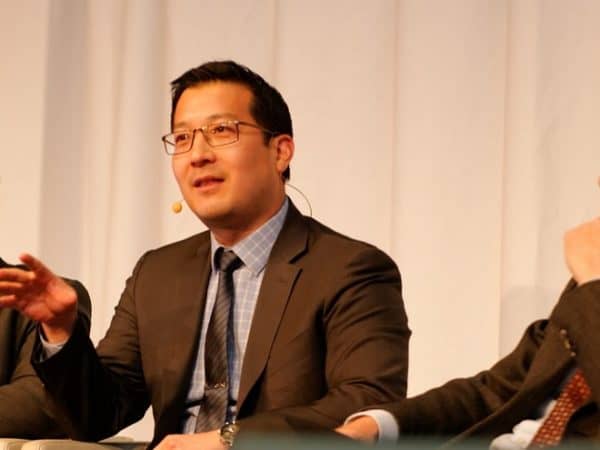

The CEO and co-founder of enterprise software company Nudge.ai, Paul Teshima, says that more and more companies are using artificial intelligence to power their platforms, which is putting a strain on the market for top AI tech talent in Toronto.
Just like all other domains of information technology, the realm of Customer Relations Management (CRM) has seen a rise in the use of cloud computing and machine learning to handle all those reams of data. A prime example is Toronto-based Nudge.ai, which last year raised $6.5 million CAD in seed funding led by OMERS Ventures. The company currently boasts over 15,000 users of both its free and subscription services, and, as the name implies, Nudge aims to give sales teams that extra edge by pooling together data on customers in order to strengthen relationships.
“Last year, CRM was a $40 billion revenue market in North America, so it’s a big sector,” says Teshima.“But we’re one of the first to really look at the relationship part, and those relationships don’t just live in your database, they’re everywhere — on your email, your calendar, your phone, your social media — so as a sales force, you need to understand how relationships are growing in all those areas.”
“The AI component is important to us,” says Teshima, who sat down with Cantech Letter at last week’s SAAS North conference in Ottawa. “We use AI to scour hundreds of pages of content about what’s going on in the world of companies and people, we look at all the relationships that are happening and then we tell you, look, here are four or five things that you as a salesperson should be paying attention to.”
In my space alone (sales productivity and sales platforms) there’s $4.6 billion of venture investment. So, today, it’s easier than ever to do a startup, but it’s harder than ever to differentiate…
Teshima and Nudge.ai co-founder Steve Woods are old hands at growing a business, having previously built up marketing automation company Eloqua which they sold to Oracle in 2012 for $957 million. But the climate has changed dramatically since Eloqua’s first steps in the early 2000s, says Teshima, who sees today’s startup scene to be much more crowded.
“In my space alone (sales productivity and sales platforms) there’s $4.6 billion of venture investment,” says Teshima. “So, today, it’s easier than ever to do a startup, but it’s harder than ever to differentiate.”
“With Nudge.ai, we have a product-led go-to-market approach, meaning that if I’m talking to a head of sales and he or she already has 20 employees using our free product, that’ll at least mean they’ll take the call and find out about our product,” he says. “It’s one way to drive growth that’s very scaleable.”
But with the rise in AI across all sectors comes greater competition for the tech talent that’s out there, says Teshima, even in a growing AI hotbed like Toronto. “It’s a ten-year training process to become a data scientist,” says Teshima. “I think it’s really hard to find good ones and I think it’s going to be one of the biggest issues out there. Certainly, there are more [AI] systems than ever because of the cloud, so you can get data sets and build models, but finding the people who know how to run them and continually improve on them is hard.”
Similar with Slack opening an office or Hootsuite opening a Toronto office. I think you’re always going to get these accordion-like ebbs and flows of talent…
Is Teshima worried by the prospect of big companies like Google and Amazon dropping down on Toronto’s tech scene and soaking up the available high-grade tech workers? Not so much, as he thinks that any investment in the tech ecosystem will pay dividends, if not immediately then down the road.
“To take one example, for a while there, when Salesforce.com moved to Toronto, everyone was working for Salesforce,” says Teshima. “But as they got bigger, some of those trained reps went back into the ecosystem. Similar with Slack opening an office or Hootsuite opening a Toronto office. I think you’re always going to get these accordion-like ebbs and flows of talent.”
“But we’re generally headed in the right direction in Toronto, because the more people that invest in tech, the more people get trained and the more that end up back in the ecosystem to help others,” says Teshima.
Leave a Reply
You must be logged in to post a comment.


 Share
Share Tweet
Tweet Share
Share



Comment